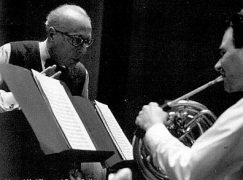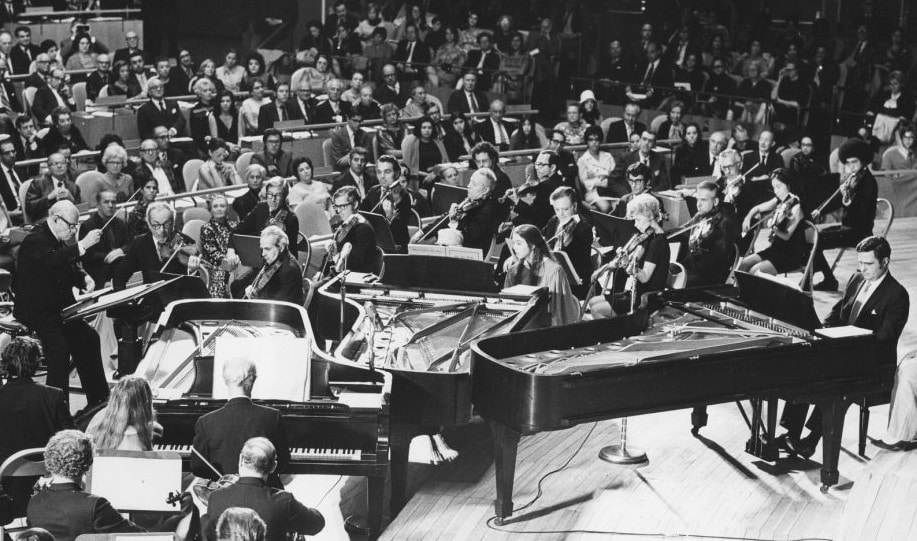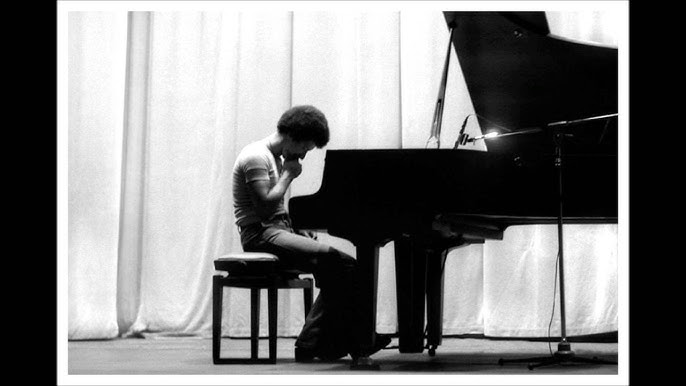In praise of George Szell
mainWe’ve received well over 100 comments on Murray Khouri’s Slipped Disc memoir of the podium monster, whether on site or on social media. Szell has lost none of his capacity to intrigue and infuriate and the keenly awaited upcoming box of Cleveland recordings will give us further cause for comment.
Some, however, see only the good in the man.
This is from Myron Bloom, 92 at Indiana University:
Hello,
I want it known that Georg Szell was an absolute genius. It was the greatest privilege of my life to be his principal horn for over 25 years. I am appalled and shocked that this article was printed. Some musicians did not have the capacity to understand the gift that they were receiving. Too bad for them but please do not besmirch this great true musician.
Myron Bloom






Count me among those who saw “only the good in the man”. I treasure the many memories I have of superb Szell performances with the Cleveland Orchestra, the New York Philharmonic and the Boston Symphony—yes, Szell guest conducted the Boston Symphony Orchestra in the early 1940s and programmed his excellent orchestration of the Smetana “From My Life” Quartet and the Schubert “Great” C Major Symphony.
An example of the meticulousness of the man: he once took me on a tour of Severance Hall, the home of the Cleveland Orchestra. I’m convinced he knew where every nail was driven into the floor of the stage!
What were you to him ?
I was a broadcaster on radio and television for 60 years, as well as for a time Consultant to the Arts Program of the Rockefeller Foundation. It was in the latter activity that I first met George Szell. We remained good friends until he died.
So you were never one of the people he screamed at.
Any thoughts on Beecham’s behaviour?
I think Szell was more the master of the well-placed, rapier-sharp cutting remark than the scream.
Mr. Bookspan is just being modest. He was the announcer for Live at Lincoln Center on PBS for 30 years, the narrator on the remastered Toscanini television concerts and the (mostly anonymous) record reviewer for Consumer Reports.
Mr. Bookspan. You have known a good number of conductors over the years so your opinion weighs heavily here. Also, Thank You for helping me a boy learn to appreciate great performances even more, so that as a man, I can comment here about them!
So very good to hear from you, Mr Bookspan! I enjoyed your announcing of the Live from the Met and Live from Lincoln Center telecasts and the NYP on the radio, too (right?). Informed and informative but never condescending, conversational but not flippant. A reassuring presence for a budding music lover ca. 1981.
i seem to also remember you and your wife doing a nice narration for a recording of music from the Nutcracker for children. *Excellent* work.
Glad to see you’re keeping a watchful eye on the music scene!
What a treat and a privilege to hear from you! I grew up during the 80s listening to you during the Philharmonic broadcasts on WQXR and looked forward to them every week……!
There is a recording from the sixties with Szell conducting the 2 Mozart symphonies nr 40 and 41, creating a beautifully authentic (!) style of orchestral Mozart playing with a regular symphony orchestra – it will have been the Cleveland – without the more literal helpings of the HIP movement like gut strings, small string group, natural horns etc. and a lot of historic documentation. He understood the music as such and got a result of which a HIP performance would dream, showing that the orchestra as a medium is as mallable as any instrument when in the right hands, and that HIP is not the only way of rendering historic works faithfully. He used HIP insights long before that movement became widely accepted and without needing to change the instruments or string group size. Now, that is musical mastery.
Moreover, the strings were not out of tune after 10 minutes. 🙂
Probably among my top 3 all-time favorite recordings of Mozart 40 & 41! Breathtaking precision – even in the finale of 41. Amazing concentration of energy. And amazing playing from an orchestra that just 15 or so years before was regarded as pretty provincial.
Nice try, but no thanks. I skipped through the 1955 mono versions and later stereo ones (which I suppose are the ones you refer to) and returned quickly and happily to my Harnoncourt or Bruggen versions. Admittedly the Szell’s 41 was way more interesting than the 40 which is rather dreadful (to my ears) in both cases.
Not a huge fan of Harnoncourt’s Mozart and yet his idea of running the last 3 Symphonies as a continuous whole works surprisingly well. The segue from the finale of 39 (such an abrupt ending) into 40 feels entirely natural.
heh, and from my bug eye’s view as a pit musician, Mozart operas always struck me as the equivalent of four symphonies, but with fewer slow movements. I’m a string player, and the 2nd act finale of The Marriage of Figaro is more taxing than any Wagner I’ve played. Sounds as if Harnoncourt hooked into Mozart’s fundamentally operatic charater.
He was an absolutely appalling interpretor of Mahler.
That may be your opinion, but it sure isn’t widely shared. His recording of the 4th is terrific. The Gramophone Good Guide always listed it as one of the best. The Penguin Guide (much missed) always gave it four stars and a Rosette – a recording of distinguished quality. The American Record guide has always placed it among the top. And most Mahler collectors I know also value it highly, right up there with Reiner’s. His 6th is similarly regarded, despite the lack of a first movement repeat. His Des Knaben Wunderhorn recording with Schwarzkopf and Fischer-Dieskau is by far my favorite. All in all, I think he was a fine Mahler interpreter.
+1
I have heard his live 9, recorded in Cleveland and available in a hard-to-get commemorative box, is very good.
Yes. It is.
And the CO boxed set containing a live recording of the 9th is equally superb with virtuoso horn playing by Mr. Bloom. I’ve always wondered why he never performed the 1st, 2nd or 5th.
I heard his Haydn Symphony no. 31 (Hornsignal ) on tour. Amazing performance from Mr. Bloom and his 3 colleagues of the horn.
Hmm…just my opinion, even as someone on the fence about many of Szell’s recordings (not lacking admiration, certainly), I think his Mahler 4th is among the best. Even if it’s not to your particular taste, to call his Mahler appalling is galling 🙂
Wouldn’t worry yourself. “He was an absolutely appalling interpretor of Mahler” is a comment without merit – just invective without any substance to back up the remark. Ignore along with the spelling of interpreter. People are entitled to their views, but someone just shouting out unsubstantiated abuse provides no value.
The 106 CD box is available now. The re-masterings sound better than any previous versions I have heard and correct some of the serious problems (missing repeat in the 3rd Movement of the Mendelssohn Italian Symphony, missing repeat at the beginning of the Brahms Haydn Variations) in previous CD issues.
Some are available on Google Play. The improvement in the Bartok is fantastic. Mahler 4 sounds much better, as does the Prokofiev 5. The Dvorak Slavonic Dances, on the other hand, hasn’t changed a bit. I’m really hoping the recordings with Fleisher, remastered, make their way to Google Play
Google Play released a few more today, including the Tchaikovsky 5th and the Schumann set. The latter I’d had in the previous remastering, which were the first Szell recordings to improve noticeably. The 2018 remastering is even better. NB: the recordings that appeared today aren’t labeled “REMASTERED,” but definitely are (original jacket icon, and labeled 2018)
With all due respect to the great Myron Bloom, I don’t think he need fear that the article besmirches the Great Man. I found it quite reasonable and, to use a term popular in US media – fair and balanced – and provided a lot of interesting detail to those who know little more than the legend.
I do find it interesting the shadow that Szell continues to cast over Cleveland, best put by the brilliant quote of Christoph Von Dohnanyi: “We give a great concert, and George Szell gets a great review.”
I’ll say it yet again. As far as ‘monsters’ go, Szell was a pussycat compared to Reiner.
And yet Harry Ellis Dickson wrote that the BSO had no complaints about Reiner (nor he about them)when he guest-conducted there. They were almost disappointed, given his reputation, when he told them that he “was enjoying [him]self immensely” during rehearsals.
Boys will be boys and conductors will be conductors – that’s why they’re up there, and not at the back the pit!
Boys will be boys and conductors will be conductors – that’s why they’re up there, and not at the back of the pit!
Eh, Szell always struck me as a fourth rate Paray.
That comment is ‘beneath contempt’.
Szell’s Haydn/Mozart/Beethoven recordings have always been top recommendations. They may not be “the best” but there are certainly none better.
Ditto his Mahler. I’ve always considered his 4th excellent – very “classical” rather then overtly “romantic”. Mahler’s music can support a wide variety of interpretations, can it not? Just listen to the recordings made by his 3 acolytes, Mengelberg, Walter, and Klemperer.
Szell’s Bruckner 3 and 8 – desert island material.
And there you have my two cent’s worth.
Funny, the Cleveland school of brass playing has also destroyed many players’ collegiate careers. Yes, both Szell and Bloom are geniuses, and yes they deserve the recognition they have earned through their grit and endurance. However, we must acknowledge that there are many other teachers out there who far surpass Szell and his gang of Cleveland-ites. It’s not all about “perfectionism”, it’s about making amazing musical moments that literally raise the hairs on your body, creating those moments that excite even the most seasoned professional. This is why Chicago will always far surpasses Cleveland: one reached for perfectionism, one reached for the thrill of the moment, that pure adrenaline and unexpected nature that can come with the 1% of conductors. THAT is what makes our music special even today, and why I continue to play. This is why I cannot subscribe to the perfectionism from Cleveland, and why many of my colleagues have suffered under those who have been products of this school of brass.
I guess Cleveland isn’t just a place where football teams die.
Wow, I am old enough to remember hearing Myron Bloom’s excellent work under Szell. Bloom and principal viola Abe Skernick both left the orchestra over the appointment of Lorin Maazel. It was front page new here in the ‘Land. Not judging, just noting. Myself, I thought Maazel was a better fit at NY Phil, tho that direct-to-disc Romeo & Juliet he did with Cleveland was a thing to hear.
The Cleveland/Maazel R&J was direct to disk? It’s a superb recording, still one of te best, but not sure that it was DTD. There was a DTD version with Leinsdorf, the LA Phil on Sheffield.
I think you’re right, Cubs.
I once owned the London 3-LP set of the Maazel/Cleveland R&J, and now I have the two-CD reissue. A standard studio recording all the way. (It’s the best non-Russian recording of the work, IMHO.)
A friend of mine, many years ago, had that Leinsdorf direct-to-disc vinyl and he played it for me on his whiz-bang multi-cool stereo system. He was more an equipment freak than a music lover, and he gleefully rattled his windows with molto volume, asking me every two minutes whether I was “digging it”.
I did not enjoy the evening.
Ah, I stand corrected. The TCO recording was d
“Direct from Cleveland.” Of all things, I knew Jack Renner. He recorded the junior high band I played in! I probably have the record somewhere.
Wonderful to hear from Myron Bloom, whose playing under Szell I had the pleasure of hearing many times in the late ‘60s, and from Martin Bookspan as well. Thank you both for being here and for helping to keep the dialogue balanced.
Incidentally, I was in the audience for Szell’s Mahler 6th in the fall of 1968, and as wonderful as the recording derived from those performances is … well, you had to be there.
Being upset that someone talks about Szell being mean to musicians (something he was famous for) is like being mad at someone for saying Trump is a serial philanderer (something he is famous for).
Everybody knows he did it, there is ample documentation over the decades, and the man himself never bothered to hide or deny it. So why get upset when someone brings it up again? Worried that it might make him look bad after all this time? (This paragraph was written to apply equally to either Trump or Szell, since the behavior of each is equally a matter of public record.)
One of the social phenomena of orchestras is that the musicians’ status is linked to the status of the conductor. They thus often overlook or rationalize behavior they shouldn’t. The higher the musician in the hierarchy, the more likely they are to rationalize the conductor’s abuse of their colleagues. (It’s OK as long as it’s not them.) This is a general principle of all authoritarian organizations and societies.
Um…I think it is a mistake to describe Szell as someone who merely bullied and abused musicians. While it is true that he was often mean and cruel, he could not have got the results he did if that is the whole truth of his behaviour. At other times he could be generous and kind; and he worked very hard to ensure his musicians were paid properly, and were properly respected by administrators and others. His behaviour was far-more nuanced than is often suggested.
Dear Mr Bloom,
Thank you for your comment. I am listening to your and Mr Szell’s recording of Strauss 1 as I type.
Could you possibly clarify one thing about your interaction with Mr Szell? I’ve heard from a couple of sources (none of whom were present, obviously) an anecdote that describes that you went to Mr Szell’s office to complain about his treatment of members of the orchestra. When facing him the story says you broke into tears, at which point Mr Szell realized he might lose a brilliant musician and changed his behaviour towards you. Is that story true or a myth?
I am particularly fond of Szell’s Mahler 4 recording, but I also think that a musical genius can be a difficult person at the same time. Acknowledging that does not necessarily besmirch his legacy.
Amusing posts. I am usually reticent to post but as a Horn player, I feel compelled to do so. Mr. Bloom flourished in the CO during the Szell regime and this is self evident in the recordings (Strauss comes to mind IMMEDIATELY). I guess it HAS been a decade but to not catch immediately who Martin Bookspan is….I am so grateful to this man for making great performances feel even MORE accessible….he was a human program for the audience at home…far superior to a printed one. As for Szell and Mahler…I must ask…. have you listened to his complete available discography? Because my money says that the previous posters who are detractors almost surely have NOT. My lament is that we never got a COMPLETE Mahler cycle from Szell. Then, we could truly disect his interpretations. Maestro Szell wasn’t for everyone but the musicians who “stuck it out” with him knew that they were part of something great. I am wondering how, had he not passed so abruptly, what we could have had 10 years later with digital recordings. That and also, the aborted plans in New York as well as Cleveland. He and Boulez were almost going to “tag team” 2 orchestras!
I was not among those fortunate enough to have heard Szell in person. It is fortunate enough for us that a good many of his “official” recordings with the Cleveland Orchestra, as well has a good many recordings made in concert (and in many ways these are more covetable, but this is in no sense denigrating the Cleveland “studio” recordings). Szell also made a number of recordings with orchestras other than the Cleveland, and there are a number of recordings (including recordings of fully staged operas, including such novelties as one or two by Rolf Liebermann, now tantalizingly available. Szell was a meticulous musician who successfully realized his objective of approaching any score as if it had never been played before and seeking a kind of clarified performance, where different sections listened to each other and fine details of phrasing and articulation were brought into bold relief. Every strand of sound mattered. You may not absolutely agree with his interpretations, but you have to admit that they’re convincing. Live Szell/Cleveland recordings which I would very much like to see offered to the public are the Verdi Requiem, the Busoni Piano Concerto with Pietro Scarpini, a marvelous Berlioz Harold in Italy with then-Principal Violist Skernick, a Tchaikovsky’s Pathetique Symphony from the 1969 Blossom Festival, Mozart symphonies 34 and 38, and I am sure there are many others. Another thing: Szell is not “better than” Toscanini, Solti, Bernstein, Karajan or anyone else of high achievement, or vice versa. Every musician worth his salt is worth listening to and enjoying, and we can be grateful for the presence of a host of musical artists who rose above the usual and gave us something of lasting value. Szell made a lasting contribution to the art of orchestral performance and we are fortunate that sound recording is what it is and we can hear enough of what he did to provide us with a big picture. Mr. Bloom is right in saying that musicians who still harbor resentment toward Szell “did not understand the gift they were receiving”.
https://www.youtube.com/watch?v=1dMhBcIVjf8
https://www.youtube.com/watch?v=0BOtsyah9rU
The Blossom Pathetique and Verdi Requiem are available on YouTube.
Szell had a fantastic ear and a meticulousness of approach second to none, but also flexibility, lyricism and passion: in just a few years he turned a provincial ensemble into one of the world’s great orchestras. His performances are almost always revelations: his Brahms, Schumann and Dvorak of course, but also Haydn, Mozart, Beethoven, Strauss (whom he new) and Tchaikovsky (which many don’t know about). Live he’s sometimes better but, generally, it’s the recordingd with his own oechestra in thir home in Severance Hall which are best.